2015-2016学年高一人教版英语必修一练习:Unit 4 验收检测 Word版含答案
- 格式:doc
- 大小:150.50 KB
- 文档页数:14
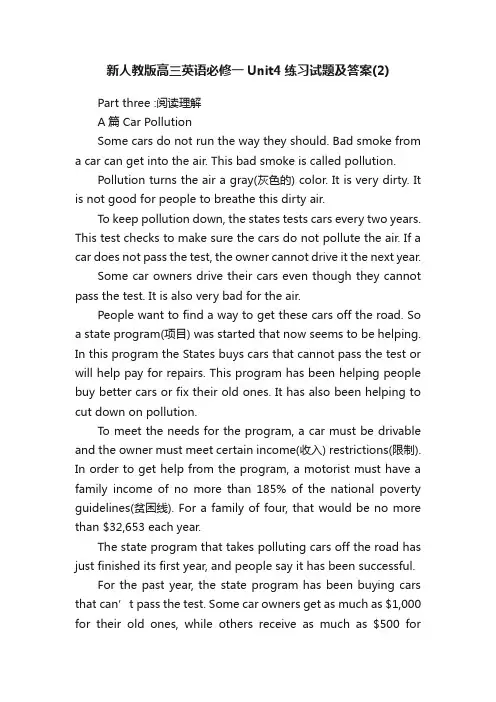
新人教版高三英语必修一Unit4练习试题及答案(2)Part three :阅读理解A篇 Car PollutionSome cars do not run the way they should. Bad smoke from a car can get into the air. This bad smoke is called pollution.Pollution turns the air a gray(灰色的) color. It is very dirty. It is not good for people to breathe this dirty air.To keep pollution down, the states tests cars every two years. This test checks to make sure the cars do not pollute the air. If a car does not pass the test, the owner cannot drive it the next year.Some car owners drive their cars even though they cannot pass the test. It is also very bad for the air.People want to find a way to get these cars off the road. So a state program(项目) was started that now seems to be helping. In this program the States buys cars that cannot pass the test or will help pay for repairs. This program has been helping people buy better cars or fix their old ones. It has also been helping to cut down on pollution.To meet the needs for the program, a car must be drivable and the owner must meet certain income(收入) restrictions(限制). In order to get help from the program, a motorist must have a family income of no more than 185% of the national poverty guidelines(贫困线). For a family of four, that would be no more than $32,653 each year.The state program that takes polluting cars off the road has just finished its first year, and people say it has been successful.For the past year, the state program has been buying cars that can’t pass the test. Some car owners get as much as $1,000 for their old ones, while others receive as much as $500 forrepairs.The cars bought by the States through the program are put out of use and sent to dismantlers(拆卸厂).46. Cars get tested every two years to make sure ________.A. the owners can get some moneyB. they can get repaired on timeC. they don’t pollute the airD. the government can decide to buy them or not47. A car owner can get some money from the program if he / she has ________.A. a motorB. only one carC. a small familyD. a low income48. After being bought by the government, a car will be ________.A. put out of useB. repairedC. tested againD. reusedB篇One silly question I simply can’t understand is “How do you feel?” Usually the question I asked of a man’s action—a man on the go, walking along the street or busily working at his desk. So what do you expect him to say? He’ll probably say, “Fine, I’m all right, ” but you’ve put a bug in his ear—maybe now he’s not sure. If you are a good friend, you may have seen something in his face, or his walk, that he overlooked(忽略) that morning. It starts him worrying a little. First thing you know, he looks in a mirror to see if everything is all right, while you go merrily on your way asking someone else. “How do you feel?”Every question has its time and place. It’s perfectly acceptable, for example, to ask “How do you feel?” if you’re visiting a close friend in hospital. But if the fellow is walking on both legs, hurrying take a train, or sitting at his desk working, it’s no time to ask him that silly question.When George Bernard Shaw, the famous writer of plays, was in his eighties, someone asked him, “How do you feel?” Shaw put him in his place. “When you reach my age, ” he said, “either you feel all right or you’re dead. ”49. The question “How do you feel?” seems to be correct and suitable when asked of ______.A. a man working at his deskB. a person having lost a close friendC. a stranger who looks worriedD. a friend who is ill50. The writer seems to feel that a busy man should______.A. be praised for his effortsB. never be asked any questionC. not be bothered(烦扰)D. be discouraged from working so hard51. George Bernard’s reply in the passages shows his______.A. cheerfulnessB. clevernessC. kindnessD. politeness新人教版高三英语必修一Unit 4练习试题答案1-5 B C D A C 6-10 B D D D D 11-15A D D D D 16-20A D A C D21-25C A C A D 26-45 ACBDC BACDA CABDD BCABD46-51CDA DCB。
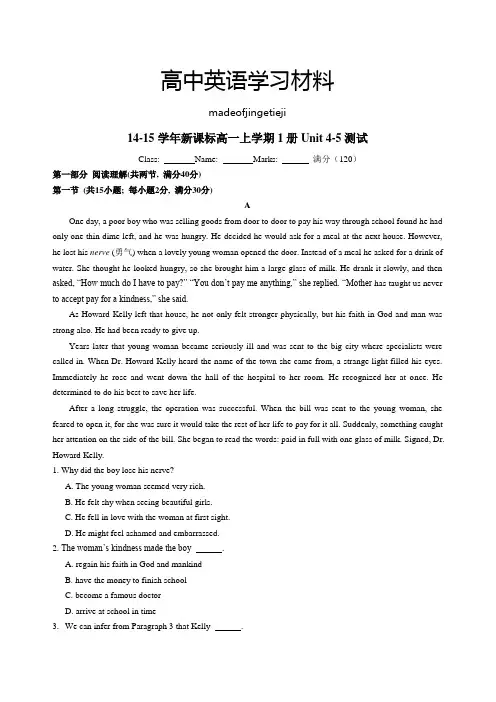
高中英语学习材料madeofjingetieji14-15学年新课标高一上学期1册Unit 4-5测试Class: Name: Marks: 满分(120)第一部分阅读理解(共两节, 满分40分)第一节(共15小题; 每小题2分, 满分30分)AOne day, a poor boy who was selling goods from door to door to pay his way through school found he had only one thin dime left, and he was hungry. He decided he would ask for a meal at the next house. However, he lost his nerve (勇气) when a lovely young woman opened the door. Instead of a meal he asked for a drink of water. She thought he looked hungry, so she brought him a large glass of milk. He drank it slowly, and then asked, “How much do I have to pay?” “You don’t pay me anything,” she replied. “Mother has taught us never to accept pay for a kindness,” she said.As Howard Kelly left that house, he not only felt stronger physically, but his faith in God and man was strong also. He had been ready to give up.Years later that young woman became seriously ill and was sent to the big city where specialists were called in. When Dr. Howard Kelly heard the name of the town she came from, a strange light filled his eyes. Immediately he rose and went down the hall of the hospital to her room. He recognized her at once. He determined to do his best to save her life.After a long struggle, the operation was successful. When the bill was sent to the young woman, she feared to open it, for she was sure it would take the rest of her life to pay for it all. Suddenly, something caught her attention on the side of the bill. She began to read the words: paid in full with one glass of milk. Signed, Dr. Howard Kelly.1. Why did the boy lose his nerve?A. The young woman seemed very rich.B. He felt shy when seeing beautiful girls.C. He fell in love with the woman at first sight.D. He might feel ashamed and embarrassed.2. The woman’s kindness made the boy .A. regain his faith in God and mankindB. have the money to finish schoolC. become a famous doctorD. arrive at school in time3. We can infer from Paragraph 3 that Kelly .A. still loved the womanB. had a thankful heart to the womanC. felt surprised at the woman’s arrivalD. was the best doctor in the cityBIt was a day before I started school again after having the world’s best summer. I was scared standing at that bus stop, for I knew that after I set foot on that bus, my freedom would be gone for a long time. I never had friends at school because of my colored clothes I always wore. My parents always said that if you want to have friends, you have to be a friend. I did that, but it didn’t work.I sat in the cold air, my nose feeling more like a snowflake (雪花). Then, the bus slowly pulled up. The door opened, and I saw many eyes staring at me. I walked to the back of the bus. As I passed the other kids, they would laugh. The bus trip seemed to take forever before we reached the school. When we arrived, I walked to my classroom and sat at the desk in the very back of the classroom. It was n’t that I disliked school, but I wasn’t a big fan of the kids at school. I enjoyed listening to the teacher talk, but I didn’t like it when the bell rang for lunch. I hid in the crowd of kids, and walked to an empty table. I opened my lunch bag, and began to eat uncomfortably. A girl with long red hair came over to my table and sat down. I got scared, but she had a friendly smile on her face.“What’s your name?” she asked.“Rachael,” I whispered.“I am Monica,” she said. She kept talking to me, and I talke d to her a little bit.“No one likes me,” I said after a while of dead silence.“I do,” she replied. “I learned that after a while of being lonely you have to be friends with people that look lonely too. Then, no one will ever be lonely in this world,” she said. Ever since those words have been said to me, I have lots of true friends.4. While waiting at the bus stop, the writer .A. recalled her happy days in summerB. felt very cold in the heavy snowC. expected to meet her classmates againD. regretted for not being free at school5. It is implied in the passage that the writer .A. feared the time of having a breakB. was tired of going to schoolC. wasn’t fond of the lectures in classD. found the back of the room to be quiet6. According to the passage, at one time Monica was .A. activeB. lonelyC. shyD. selfish7. What did the writer learn in the end?A. A friend to everybody is a friend to nobody.B. A friend is never known till a man has need.C. Making friends with lonely people makes a happier world.D. We should share what we have with our friends.CThere was once a boy who liked nothing more in the world than to win. He loved winning at whatever it might be: f ootball, cards, video games... And because he couldn’t stand losing, he had become an expert in all kinds of tricks. He could play tricks in every situation without being noticed, even in video games or playing alone. He could win without ever being caught.He won so many times that everyone saw him as the champion. It meant that almost no one wanted to play with him. One person who did play with him was a poor boy. He was a bit younger. The champion really enjoyed himself by making the boy look foolish.But the champion ended up getting bored. He needed something more, so he decided to apply for the national video games championship, where he would find some competitors worthy of himself. At the championship he was eager to show his skills, but when he tried using all those tricks he knew from a thousand different games, none of them worked. The judges had prevented (阻止) any of the tricks from working.He felt embarrassed: he was a good player, but without his tricks, he couldn’t beat a single competitor. Finally, the judges announced the name of the champion. It was the poor boy whom he had always beaten!The boy realized that the poor boy had been cleverer than him. It hadn’t mattered to the poor boy if he lost or got a good beating, because what he was really doing was learning from each of his defeats. And from so much learning he had become a real master.8. Why could the boy manage to win at everything?A. Because he was good at playing tricks.B. Because he knew every situation well.C. Because he was cleverer than others.D. Because he had better skills than others.9. At the championship, .A. the judges praised the boy for his skillsB. the judges stopped the boy from cheatingC. the boy was quite proud of his excellent skillsD. the boy defeated all the other competitors easily10. How did the boy find the result of the championship?A. Reasonable.B. Surprising.C. Unfair.D. Encouraging.11. What can we learn from the experience of the poor boy?A. Pride goes before a fall.B. A good beginning is half done.C. Failure is the mother of success.D. Never judge a book by its cover.DHere’s something to think about the next time you ask your teacher for help: do schoolwork on your own can help you learn. According to a recent study, the more you struggle(努力) while you are learning new information, the better you can remember it later.It might surprise you. When teachers are presenting new information, they often give students lots of help. But a new study shows this may not be the best way to support learning. “Don’t be too quick to get help when learning something new,” education expert Manu Kapur said. “Try to work on it yourself even if it means trying different ways.”Kapur came up with the idea that struggling can lead to better learning. Then he tested it out on students in Singapore. He separated students into two groups. In the first group, students were asked to solve math problems with the teacher’s help. In the second group, students were asked to solv e the same problems by helping one another instead of getting help from the teacher.With the teacher’s help, students in the first group were able to find the correct answers. Students in the second group did not solve the problems correctly, but they did come up with a lot of good ideas.The students were then tested on what they had learned. The group without any help from a teacher scored much higher than the group who had help. Kapur said working to find the answers helped students understand the process (过程), not just the solution.Kapur’s advice for kids is to put a lot of effort into learning something new rather than going to your teacher for help. “Simply doing a little work or nothing at all won’t work,” says Kapur. “The struggle needs to be a real attempt to figure out (想出) or solve a problem in as many ways as possible.”12. Which of the following is the best way to learn according to the passage?A. Figure something out on your own.B. Ask teachers for help in time.C. Be given the solution to the problem.D. Pay little attention to the process.13. Kapur supported his idea by .A. showing causesB. describing an activityC. making a testD. introducing a method14. In the last paragraph, Kapur advised students to .A. make efforts to win help from othersB. use their head in an active wayC. make an attempt at something newD. work out every difficult problem15. What would be the best title for the passage?A. Raise your headB. Try your handsC. Stand on your own feetD. Work your mind第二节(共5小题; 每小题2分, 满分10分)根据短文内容,从短文后的选项中选出能填入空白处的最佳选项。
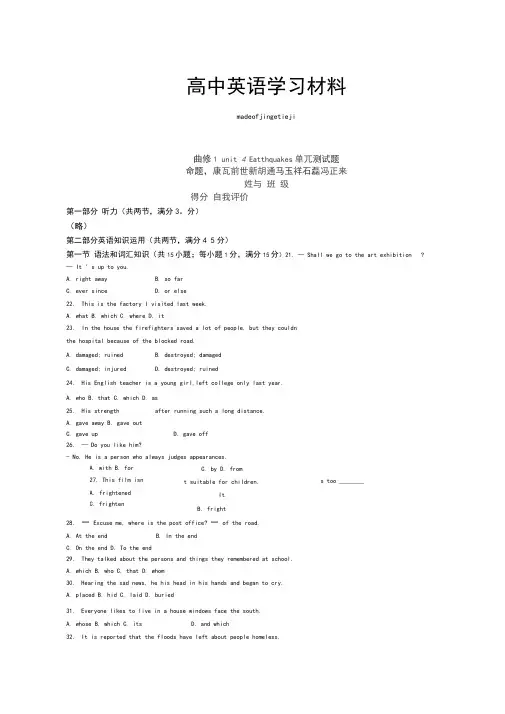
高中英语学习材料madeofjingetieji曲修1 unit 4 Eatthquakes 单兀测试题命题,康瓦前世新胡通马玉祥石磊冯正来姓与 班 级得分 自我评价第一部分 听力(共两节,满分3。
分)(略)第二部分英语知识运用(共两节,满分4 5分)第一节 语法和词汇知识(共15小题;每小题1分,满分15分)21. — Shall we go to the art exhibition?— It ' s up to you.A. right awayB. so farC. ever sinceD. or else22. This is the factory I visited last week.A. whatB. whichC. whereD. it23. In the house the firefighters saved a lot of people, but they couldnthe hospital because of the blocked road.A. damaged; ruinedB. destroyed; damagedC. damaged; injuredD. destroyed; ruined24. His English teacher is a young girl,left college only last year.A. whoB. thatC. whichD. as25. His strength after running such a long distance.A. gave awayB. gave outC. gave upD. gave off26. — Do you like him?- No. He is a person who always judges appearances.28. 一 Excuse me, where is the post office? 一 of the road.A. At the endB. In the endC. On the endD. To the end29. They talked about the persons and things they remembered at school.A. whichB. whoC. thatD. whom30. Hearing the sad news, he his head in his hands and began to cry.A. placedB. hidC. laidD. buried31. Everyone likes to live in a house windows face the south.A. whoseB. whichC. itsD. and which32. It is reported that the floods have left about people homeless. A. with B. for 27. This film isn A. frightened C. frightenC. byD. fromt suitable for children. ItB. frights too ________A. two millionsB. two-millionsC. two millionD. two millions of33. A great of foreign guests come to our school for a visit every year.A. dealB. numberC. manyD. amount34.The helicopter (直升飞机)arrived at the scene of the accident quickly to the survivors.A. keepB. protectC. shakeD. rescue35.The farmers in that area are in a terrible because of the water shortage.A. directionB. pointC. disasterD. attitude第二节完形填空(共20小题;每小题1.5分,满分30分)It was Tom's first visit to England, and he was looking forward to his first journey on London ' s Underground Railway. And against his friends ' 36 , he was determined to travel37 .He entered the station shortly after five o' clockn the afternoon. This is a 38 time to travel in London, 39 crowds of people go home from work at this hour. He 40 to join a long line of people waiting for tickets. When at last his 41 came, he had some difficulty in making himself understood by the ticket seller. 42 , he got the right ticket in the end and by asking people the 43 , he also found the right platform. It was 44 with people. He did not 45 to get on the first train, but he was able to move nearer to the platform so as to be in a better 46 to get on the next one. When this train came in, Tom was 47 forward onto the train by the 48 of people from behind. The doors closed and the train moved off. He was unable to see the 49_ of the stations where the train 50 , but he knew that the station he wanted was the sixth 51 along the line. When the train reached the sixth station, Tom got off, feeling 52 that his journey had been so easy. But he suddenly realized that he had come to a station he had never 53 . He explained his 54 to a man who was standing on the platform. With a 55 on his face, he told Tom that he had caught a train going in the opposite direction.36. A. thought B. advice C. relation D. favor37. A. alone38. A. short39. A. for40. A. planned41. A. luck42. A. Thus43. A. question44. A. packed45. A. manage46. A. situation47. A. fought48. A. speed49. A. signs50. A. left B. abroad C. along D. awayB. certainC. possibleD. badB. andC.soD. butB. hadC. happenedD. hopedB. timeC. chanceD. turnB. InsteadC. ThereforeD. However B. way C. place D. conditionB. caughtC. coveredD. seizedB. tryC. agreeD. expectB. stateC. positionD. seatB. sweptC. drawnD. broughtB. supportC. strikeD. pushB. pointsC. namesD. numbersB. stoppedC. startedD. movedB. smileC. surpriseD. pity第三部分 阅读理解(共2 0小题;每小题2分,满分4。
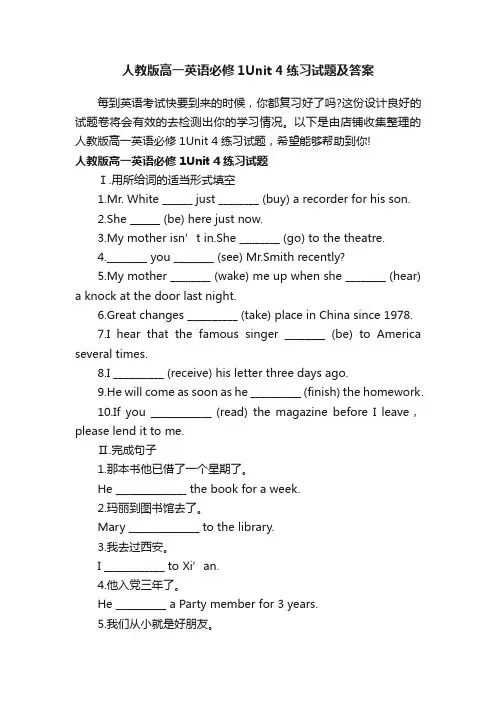
人教版高一英语必修1Unit 4练习试题及答案每到英语考试快要到来的时候,你都复习好了吗?这份设计良好的试题卷将会有效的去检测出你的学习情况。
以下是由店铺收集整理的人教版高一英语必修1Unit 4练习试题,希望能够帮助到你!人教版高一英语必修1Unit 4练习试题Ⅰ.用所给词的适当形式填空1.Mr. White ______ just ________ (buy) a recorder for his son.2.She ______ (be) here just now.3.My mother isn’t in.She ________ (go) to the theatre.4.________ you ________ (see) Mr.Smith recently?5.My mother ________ (wake) me up when she ________ (hear)a knock at the door last night.6.Great changes __________ (take) place in China since 1978.7.I hear that the famous singer ________ (be) to America several times.8.I __________ (receive) his letter three days ago.9.He will come as soon as he __________ (finish) the homework.10.If you ____________ (read) the magazine before I leave,please lend it to me.Ⅱ.完成句子1.那本书他已借了一个星期了。
He ______________ the book for a week.2.玛丽到图书馆去了。
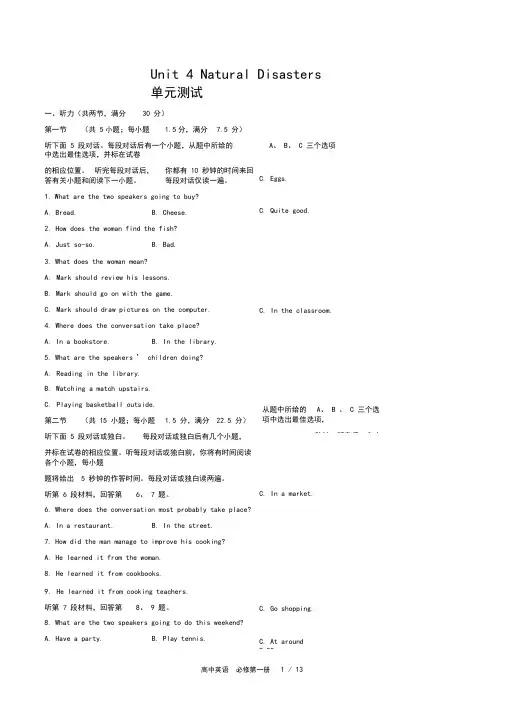
Unit 4 Natural Disasters单元测试一、听力(共两节,满分30 分)第一节(共 5小题;每小题 1.5分,满分7.5 分)听下面 5 段对话。
每段对话后有一个小题,从题中所给的A、 B、 C 三个选项中选出最佳选项,并标在试卷的相应位置。
听完每段对话后,你都有 10 秒钟的时间来回答有关小题和阅读下一小题。
每段对话仅读一遍。
1.What are the two speakers going to buy?A. Bread.B. Cheese.2.How does the woman find the fish?A. Just so-so.B. Bad.3.What does the woman mean?A.Mark should review his lessons.B.Mark should go on with the game.C.Mark should draw pictures on the computer.4.Where does the conversation take place?A. In a bookstore.B. In the library.5.What are the speakers ’ children doing?A.Reading in the library.B.Watching a match upstairs.C.Playing basketball outside.第二节(共 15 小题;每小题 1.5 分,满分22.5 分)听下面 5 段对话或独白。
每段对话或独白后有几个小题,并标在试卷的相应位置。
听每段对话或独白前,你将有时间阅读各个小题,每小题题将给出 5 秒钟的作答时间。
每段对话或独白读两遍。
听第 6 段材料,回答第6、 7 题。
6.Where does the conversation most probably take place?A. In a restaurant.B. In the street.7.How did the man manage to improve his cooking?A. He learned it from the woman.8.He learned it from cookbooks.9.He learned it from cooking teachers.听第 7 段材料,回答第8、 9 题。
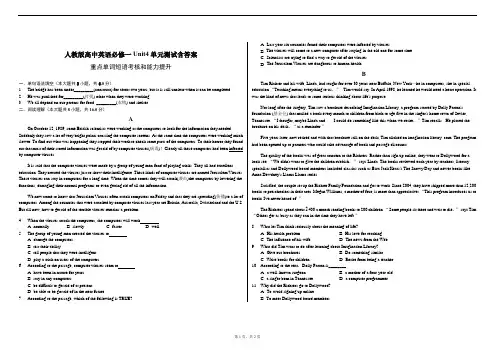
人教版高中英语必修一Unit4单元测试含答案重点单词短语考核和能力提升一、单句语法填空(本大题共3小题,共6.0分)1.The bridge has been under_________(construct) for about two years, but it is still unclear when it can be completed.2.He was punished for_________(打扰) other when they were working.3.We all depend on our parents for food, _________(衣物) and shelter.二、阅读理解(本大题共8小题,共16.0分)AOn October 12, 1989, some British scientists were working at the computers to look for the information they needed. Suddenly they saw a lot of very bright points crossing the computer screens. At the same time the computers were working much slower. To find out what was happening they stopped their work to check some parts of the computers. To their horror,they found out that most of their stored information was got rid of by computer viruses(病毒)!Clearly all these computers had been infected by computer viruses.It is said that the computer viruses were made by a group of young men fond of playing tricks. They all had excellent education. They created the viruses just to show their intelligence. These kinds of computer viruses are named Jerusalem Viruses. These viruses can stay in computers for a long time. When the time comes they will attack(袭击)the computers by lowering the functions, damaging their normal programs or even getting rid of all the information.We now come to know that Jerusalem Viruses often attack computers on Friday and that they are spreading(传播)to a lot of computers. Among the countries that were attacked by computer viruses last year are Britain, Australia, Switzerland and the U.S. But till now, how to get rid of the terrible viruses remains a problem.4.When the viruses attack the computers, the computers will work .A. normallyB. slowlyC. fasterD. well5.The group of young men created the viruses to .A. damage the computersB. test their abilityC. tell people that they were intelligentD. play a trick on users of the computers6.According to the passage, computer viruses seem to .A. have been in nature for yearsB. stay in any computersC. be difficult to get rid of at presentD. be able to be got rid of in the near future7.According to the passage, which of the following is TRUE?A. Last year six countries found their computers were infected by viruses.B. The viruses will come to a new computer after staying in the old one for some time.C. Scientists are trying to find a way to get rid of the viruses.D. The Jerusalem Viruses are dangerous to human health.BTim Richter and his wife, Linda, had taught for over 30 years near Buffalo, New York—he in computers, she in special education.“Teaching means everything to us,” Tim would say. In April 1998, he learned he would need a heart operation. It was the kind of news that leads to some serious thinking about life's purpose.Not long after the surgery, Tim saw a brochure describing Imagination Library, a program started by Dolly Parton's foundation (基金会) that mailed a book every month to children from birth to age five in the singer's home town of Sevier, Tennessee. “I thought, maybe Linda and I could do something like this when we retire,”Tim recalls. He placed the brochure on his desk,“as a reminder.”Five years later, now retired and with that brochure still on the desk, Tim clicked on imagination library .com. The program had been opened up to partners who could take advantage of book and postage discounts.The quality of the books was of great concern to the Richters. Rather than sign up online, they went to Dollywood for a look-see. “We didn't want to give the children rubbish,” says Linda. The books reviewed each year by teachers, literacy specialists and Dollywood board members included classics such as Ezra Jack Keats's The Snowy Day and newer books like Anna Dewdney's Llama Llama series.Satisfied, the couple set up the Richter Family Foundation and got to work. Since 2004, they have shipped more than 12,200 books to preschoolers in their area. Megan Williams, a mother of four, is more than appreciative: “This program introduces us to books I've never heard of .”The Richters spend about $ 400 a month sending books to 200 children. “Some people sit there and wait to die,” says Tim. “Others get as busy as they can in the time they have left.”8.What let Tim think seriously about the meaning of life?A. His health problem.B. His love for teaching.C. The influence of his wife.D. The news from the Web.9.What did Tim want to do after learning about Imagination Library?A. Give out brochures.B. Do something similar.C. Write books for children.D. Retire from being a teacher.10.According to the text,Dolly Parton is________.A. a well-known surgeonB. a mother of a four-year-oldC. a singer born in TennesseeD. a computer programmer11.Why did the Richters go to Dollywood?A. To avoid signing up online.B. To meet Dollywood board members.C. To make sure the books were the newest.D. To see if the books were of good quality.15.【答案】【小题1】B 【小题2】C 【小题3】C 【小题4】C【解析】【文章大意】1989年10月12日,一些英国科学家在计算机上工作,寻找他们需要的信息。
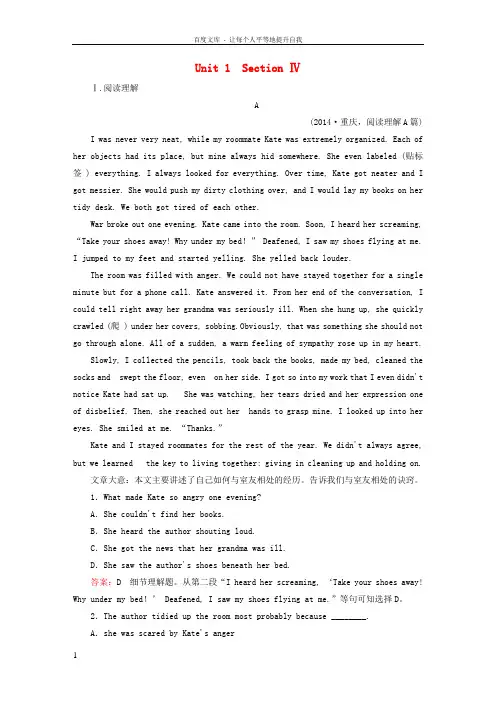
Unit 1 Section ⅣⅠ.阅读理解A(2014·重庆,阅读理解A篇)I was never very neat, while my roommate Kate was extremely organized. Each of her objects had its place, but mine always hid somewhere. She even labeled (贴标签 ) everything. I always looked for everything. Over time, Kate got neater and I got messier. She would push my dirty clothing over, and I would lay my books on her tidy desk. We both got tired of each other.War broke out one evening. Kate came into the room. Soon, I heard her screaming, “Take your shoes away! Why under my bed!” Deafened, I saw my shoes flying at me.I jumped to my feet and started yelling. She yelled back louder.The room was filled with anger. We could not have stayed together for a single minute but for a phone call. Kate answered it. From her end of the conversation, I could tell right away her grandma was seriously ill. When she hung up, she quickly crawled (爬 ) under her covers, sobbing.Obviously, that was something she should not go through alone. All of a sudden, a warm feeling of sympathy rose up in my heart.Slowly, I collected the pencils, took back the books, made my bed, cleaned the socks and swept the floor, even on her side. I got so into my work that I even didn't notice Kate had sat up. She was watching, her tears dried and her expression one of disbelief. Then, she reached out her hands to grasp mine. I looked up into her eyes. She smiled at me. “Thanks.”Kate and I stayed roommates for the rest of the year. We didn't always agree, but we learned the key to living together: giving in cleaning up and holding on.文章大意:本文主要讲述了自己如何与室友相处的经历。
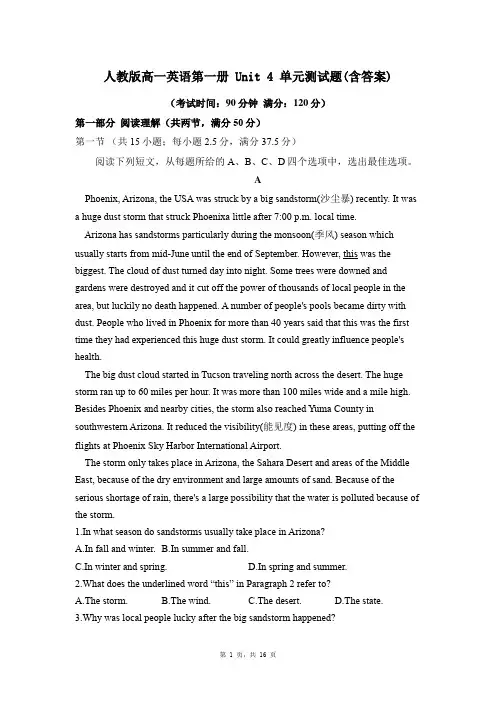
人教版高一英语第一册 Unit 4 单元测试题(含答案)(考试时间:90分钟满分:120分)第一部分阅读理解(共两节,满分50分)第一节(共15小题;每小题2.5分,满分37.5分)阅读下列短文,从每题所给的A、B、C、D四个选项中,选出最佳选项。
APhoenix, Arizona, the USA was struck by a big sandstorm(沙尘暴) recently. It was a huge dust storm that struck Phoenixa little after 7:00 p.m. local time.Arizona has sandstorms particularly during the monsoon(季风) season which usually starts from mid-June until the end of September. However, this was the biggest. The cloud of dust turned day into night. Some trees were downed and gardens were destroyed and it cut off the power of thousands of local people in the area, but luckily no death happened. A number of people's pools became dirty with dust. People who lived in Phoenix for more than 40 years said that this was the first time they had experienced this huge dust storm. It could greatly influence people's health.The big dust cloud started in Tucson traveling north across the desert. The huge storm ran up to 60 miles per hour. It was more than 100 miles wide and a mile high. Besides Phoenix and nearby cities, the storm also reached Yuma County in southwestern Arizona. It reduced the visibility(能见度) in these areas, putting off the flights at Phoenix Sky Harbor International Airport.The storm only takes place in Arizona, the Sahara Desert and areas of the Middle East, because of the dry environment and large amounts of sand. Because of the serious shortage of rain, there's a large possibility that the water is polluted because of the storm.1.In what season do sandstorms usually take place in Arizona?A.In fall and winter.B.In summer and fall.C.In winter and spring.D.In spring and summer.2.What does the underlined word “this” in Paragraph 2 refer to?A.The storm.B.The wind.C.The desert.D.The state.3.Why was local people lucky after the big sandstorm happened?A.People's health was not influenced.B.It didn't do harm to people's gardens.C.All the local people in the area survived.D.The electricity was not affected at all.4.What can probably be the title of the passage?A.Phoenix, Arizona has more sandstormsB.Sandstorms do a great deal of harm to peopleC.We must do something to prevent sandstormsD.Phoenix, Arizona experienced a huge sandstormBA 9.0-magnitude earthquake off the Indonesian coast sent a wall of water racing toward Thailand, Malaysia and Sri Lanka. Lang was on the island of Phi Phi Don, just south of Phuket, Thailand, shopping on Main Street with her friend Rubina Wong, when suddenly everything changed. "People started running inland. From where we were, we could not see the beach so we had no idea what was going on," she said.Lang and Rubina started running inland in the same direction as everyone else, when she noticed water flooding into the island, but it was so strong and fast that she could no longer lift her feet to run. Rubina had gone down a side street. Lang never saw her alive again.Lang was stuck underwater between pieces of debris(碎片) with the surface just above her face. "The more I struggled(挣扎), the tighter I was stuck. I could not reach the surface. I thought I came here on my vacation to die, and then I got really annoyed," she said. "I must have blacked out because the next thing I remember is waking up underwater."The water was still and black. Lang looked up and could see that at the top, there was a small circle of light. She started swimming through the water and made it to the surface of the water. She pulled herself onto a floating door and could see that the whole island was flooded and a lot of buildings were gone. She could see a house not far away and a man on its roof. She encouraged herself to climb over the floating objects to the balcony(阳台) of the house. From there she saw the water start to slowly go back to the ocean.5.What was Lang doing when the tsunami happened?A.She was running in a race.B.She was playing on the beach.C.She was shopping in the street.D.She was looking for her friend.6.Why was Lang unable to run?A.There was a wall in the way.B.She feared she would get lost.C.She had to wait for her friend.D.The racing water was too powerful.7.What can we learn about Lang from Paragraph 3?A.She didn't want to struggle.B.She was trapped underwater.C.She didn't regret going on vacation.D.She kept awake all the time in the water.8.How did Lang manage to save herself?A.By calling for help.B.By hiding in a house.C.By climbing up a tall tree.D.By making use of floating objects.CWhat do you think of when you hear the word “drought”? Do you think of “dry” “hot” “dusty” “cracked(开裂的)earth” or even “no water”? If so, you’re on the right track!When some places are in drought, they may be dry, hot and dusty. Cracks may appear in the soil, and rivers, lakes, streams, and other sources of water may go dry. Other places in drought get some rain, but not as much as they usually receive during that season. Drought means that a place has less rain or snow than normal over a few months or even longer.Drought has many causes. It can be caused by not receiving rain or snow over a period of time. We learned in the discussions above about the water cycle and weather. The changes in the wind patterns that move clouds and moisture through the atmosphere can cause a place not to receive its normal amount of rain or snow over a long period of time.If you live in a place where most of the water you use comes from a river, a drought in your area can be caused by places upstream from you not receiving enough moisture. There would be less water in the river for you and other people who live along the river to use.People can also play a big role in a drought. If we use too much water during times of normal rainfall, we might not have enough water when a drought happens.9.What’s the purpose of Paragraph 1?A. To introduce the topic.B. To analyze the problem.C. To conclude the article.D. To put forward an argument.10.What will happen if a place is in drought?A. The weather will be dry, hot and windy.B. There won’t be any water left in rivers or lakes.C. There will be less rain or snow for quite a long time.D. The rainy season will be replaced by the snowy season.11.What’s the meaning of the underlined word “moisture” in Paragraph 3?A. Dust in the wind.B. Rain in the soil.C. Snow on the ground.D. Water in the air.12.What topics are discussed before the passage?A. The definition(定义) of drought.B. The water cycle and weather.C. The causes of drought.D. The influence of drought.DThe Horn of Africa was struck by billions of locusts(蝗虫). They flew through fields of crops at an amazing speed, killing crops in the process. The locusts crossed the Gulf of Aden and arrived in Somalia and Ethiopia. They were then found in Kenya and had become the worst disaster there in 70 years.The U.N. says the area is affected by lack of food, and it warns that the international community only has a small window of opportunity to prevent future disaster". "These things are always voracious," says Keith Cressman. A swarm(一大群) the size of Manhattan can, in a single day, eat the same amount of food as everyone in both New York and California, he says. Swarms of desert locusts more than three times the size of New York City have been seen in northeast Kenya.Experts know how to stop the locusts' spread, but say efforts have been prevented by a lack of resources because it's difficult to spray pesticide(喷洒农药) in conflict-racked(冲突肆虐的) places such as Somalia and Yemen. "We do have a chance to solve this problem in the bud, but that's not what we're doing at the moment," Mark Lowcock said. "We're running out of time."Desert locusts are known for their rapid reproduction and ability to move long distances with the wind. "This kind of insect has been around for a long time," Mark Lowcock said. "It has so many different survival ways...to just survive in some of the harshest conditions and remotest parts of the planet. But it has the great ability to take advantage of good conditions." It reproduces rapidly—every three months, and in suitable conditions, the population could increase by 400 times every six months.13.Where might locusts first appear?A.In Ethiopia.B.In Somalia.C.In Kenya.D.In the Gulf of Aden.14.What does the underlined word “voracious” mean?A.Expecting to fly.B.Wanting to eat.C.Being curious.D.Being cautious.15.Which might be the cause of the locusts' spread?A.Experts' unawareness of how to prevent the locusts' spread.ck of people to deal with locusts.C.The good living environment of the desert.D.Losing the chance to solve the locust problem in the bud.16.What is Paragraph 4 mainly about?A.Desert locusts' ability to take advantage of good conditions.B.Desert locusts' long life on the earth.C.Desert locusts' ability to reproduce and survive.D.Desert locusts' different survival abilities.第二节(共5小题;每小题2.5分,满分12.5分)根据短文内容,从短文后的选项中选出能填入空白处的最佳选项。
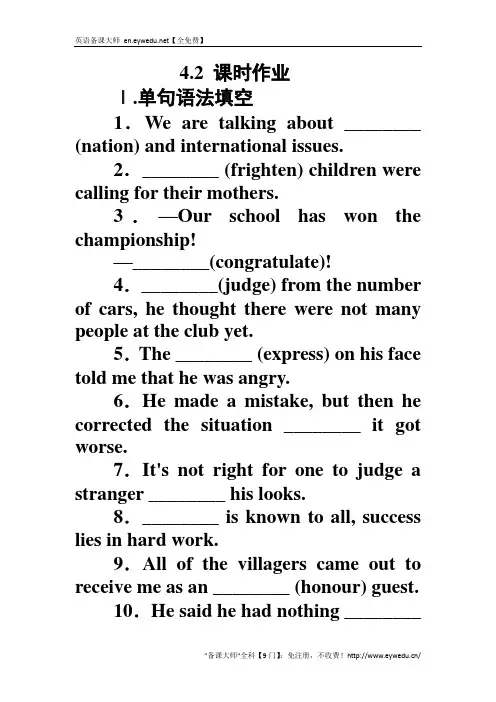
4.2 课时作业Ⅰ.单句语法填空1.We are talking about ________ (nation) and international issues.2.________ (frighten) children were calling for their mothers.3.—Our school has won the championship!—________(congratulate)!4.________(judge) from the number of cars, he thought there were not many people at the club yet.5.The ________ (express) on his face told me that he was angry.6.He made a mistake, but then he corrected the situation ________ it got worse.7.It's not right for one to judge a stranger ________ his looks.8.________ is known to all, success lies in hard work.9.All of the villagers came out to receive me as an ________ (honour) guest.10.He said he had nothing ________(be) afraid of.答案:1.national 2.Frightened 3.Congratulations4.Judging 5.expression 6.before 7.by8.As9.honoured10.to beⅡ.介、副词填空1.He is not an honest man, so you can't believe ________ him.2.People always shake hands ________ each other when they meet.3.The price of wheat has risen ________ 10 percent this year.4.He looked out ________ the window and saw an old friend.5.That morning he went to school by bike ________ usual.6.The farmer dug ________ some ancient coins when he was working in the fields.7.We are proud ________ being Chinese.8.The world seemed ________ its end when the flood happened.9.The Great Wall, known ________ Ten Thousand li Great Wall,is actually more than 10,000 metres long.10.He thought little ________ my advice.答案:1.in 2.with 3.by 4.of 5.as 6.out7.of8.at9.as10.ofⅢ.短语填空1.He didn't know how to come back home because his money was ____________.2.Many buildings are ____________ because of the big flood.3.Don't lift that toolbox—you'll ____________ yourself!4.On hearing the good news, he shared it with his parents ____________.5.Some robbers ________ that house, and robbed many things of it.6.Hurry up! It looks ____________ it is going to rain.7.____________ people are fond of music.8.As soon as he knew that they were in danger, he ____________ immediately.9.They ____________ the burning hotel.10.He was buried by an avalanche(雪崩) and had to ____________.答案:1.at an end 2.in ruins 3.do an injury to4.right away 5.burst into 6.as if 7.A great number of8.came to their rescue9.were trapped in10.be dug out Ⅳ.完成句子1.Tom ___________________(十分自豪) his new car.2.I _______________(很高兴) to do business with you.3.I would like to ________(给你一些建议) in the name of a friend.4.I would like to ______________(表达谢意) to those who have helped me out of trouble.5.He was honored _____________(因他所做的).6._____________________________ _(由他的话判断), the accident was terrible.7.Please ______________(接受我诚挚的道谢) and best wishes.8.I want to ________________(祝贺他成功).答案:1.is very proud of 2.am very pleased3.give you some advice 4.express my thanks5.for what he had done 6.Judging from what he said7.accept my sincere thanks 8.congratulate him on his successⅤ.阅读理解Wind, water, fire and ice—these powerful natural forces have shaped the land of America in the past. They are still changing it today. The Colorado Riverslowly cut down through stone to make the Grand Canyon(大峡谷).Wind and rainstorm hit the land from time to time. Fires sometimes burn down forests and destroy the homes of wild animals. This happened in Yellowstone Park in 1988.Dead volcanic(火山) mountains such as Haleakala on Maui and Carter Lake in Oregon are beautiful to look at. But there are several active volcanoes in the US, especially along the Pacific Coast. There are also many earthquakes in this area. Scientists can do nothing to control earthquakes or volcanoes. This was shown clearly on May 18, 1980. At 8:32 that morning, Mount St. Helens in Washington state erupted(爆发). The top of the mountain was blown off.Over 60 people—campers, scientists, journalists, forest workers—were killed. Hundreds of square miles of forests were knocked down. In towns over 100 miles away, day suddenly became night. An ash cloud hid the sun for many hours. Townsand fields in Washington, Oregon, and Idaho were covered with dirty gray ash.Scientists knew that Mt St. Helens might erupt soon. But no one could say when. Scientists had asked people to move away because the volcano was becoming dangerous. But Harry R. Truman, 84, owned a small hotel in Mt St. Helens would not leave his home. Now it is covered with many feet of dirty ash.But slowly, life is returning to the dead area around the mountain. Grass and small plants are beginning to grow again. Deer and birds have been seen. The land will never be the same as it once was. Perhaps Mt St. Helens will erupt again. But this is all part of nature's pattern of change, and man has little power to control it.1.What is the best title of this passage?A.Wind, Water, Fire and IceB.Volcano's Beauty and DangerC.The Power of NatureD.Natural Force Shapes BeautifulLand of America2.There are several active volcanoes in the US, which mainly lie ________.A.along the Colorado RiverB.in Yellowstone ParkC.along the Pacific CoastD.in Washington, Oregon, and Idaho3.After the eruption of volcano, what makes the sky turn dark?A.The smoke.B.The clouds.C.The fog.D.The ash.4.The underl ined word “it” in the fifth paragraph means ________.A.the body of old HarryB.the place of Harry's homeC.the opening on top of Mt St. HelensD.the place where Harry probably died答案与解析:1.解析:标题概括题。
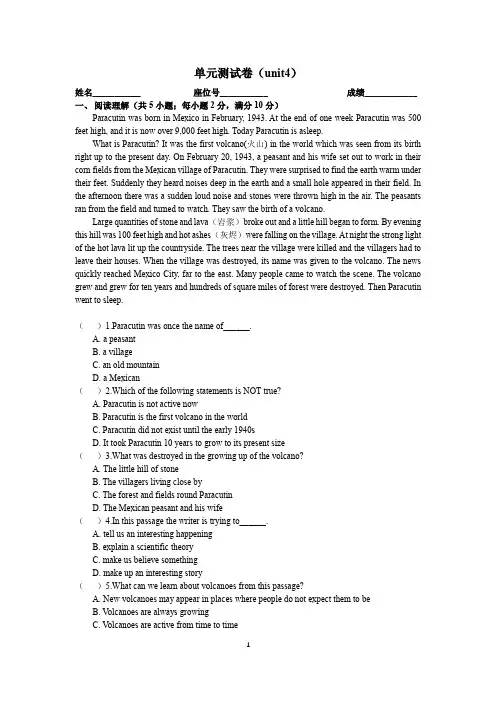
单元测试卷(unit4)姓名___________ 座位号___________ 成绩____________一、阅读理解(共5小题;每小题2分,满分10分)Paracutin was born in Mexico in February, 1943. At the end of one week Paracutin was 500 feet high, and it is now over 9,000 feet high. Today Paracutin is asleep.What is Paracutin? It was the first volcano(火山) in the world which was seen from its birth right up to the present day. On February 20, 1943, a peasant and his wife set out to work in their corn fields from the Mexican village of Paracutin. They were surprised to find the earth warm under their feet. Suddenly they heard noises deep in the earth and a small hole appeared in their field. In the afternoon there was a sudden loud noise and stones were thrown high in the air. The peasants ran from the field and turned to watch. They saw the birth of a volcano.Large quantities of stone and lava(岩浆)broke out and a little hill began to form. By evening this hill was 100 feet high and hot ashes(灰烬)were falling on the village. At night the strong light of the hot lava lit up the countryside. The trees near the village were killed and the villagers had to leave their houses. When the village was destroyed, its name was given to the volcano. The news quickly reached Mexico City, far to the east. Many people came to watch the scene. The volcano grew and grew for ten years and hundreds of square miles of forest were destroyed. Then Paracutin went to sleep.()1.Paracutin was once the name of______.A. a peasantB. a villageC. an old mountainD. a Mexican()2.Which of the following statements is NOT true?A. Paracutin is not active nowB. Paracutin is the first volcano in the worldC. Paracutin did not exist until the early 1940sD. It took Paracutin 10 years to grow to its present size()3.What was destroyed in the growing up of the volcano?A. The little hill of stoneB. The villagers living close byC. The forest and fields round ParacutinD. The Mexican peasant and his wife()4.In this passage the writer is trying to______.A. tell us an interesting happeningB. explain a scientific theoryC. make us believe somethingD. make up an interesting story()5.What can we learn about volcanoes from this passage?A. New volcanoes may appear in places where people do not expect them to beB. V olcanoes are always growingC. V olcanoes are active from time to timeD. New volcanoes are active for only ten years二、完形填空(共20小题;每小题1.5分,满分30分)The amount of usable water has always been of great interest in the world.__1__springs and streams sometimes means control,particularly in the __2__ areas like the desert.The control is possible even without possession of large areas of __3__ land. In the early days of the American West,gun fights were not __4__ for the water resources,and laws had to be __5_ to protect the water rights of the__6__ and the use of the water resources accordingly.__7__ is known to us all, there is not __8__ water in all places for everyone to use as much as he likes. Deciding on the __9__ of water that will be used in any particular period __10__ careful planning, so that people can manage and use water more __11__. Farmers have to change their use of or demand for water __12__ the water supply forecast.The__13__ water supply forecast is based more on the water from the __14__ than from the below. Interest is __15__ in the ways to increase rainfall by man-made methods, and to get water from the winter snow on mountain __16__. With special equipment, some scientists are studying the ways in which the mountain snow can be__17__, and with the help of a repeater station, they send the__18__ data(数据)to the base station. The operator at the base station can get the data at any time by __19__ a button. In the near future, the forecast and use of water __20__ probably depend on the advance knowledge of snow on mountains, not of water underground.()1.A. Using()2.A. dry()3.A. fine()4.A. unlawful()5.A. made()6.A. winners()7.A. That()8.A. plentiful()9.A. type()10.A. requests()11.A. effectively ()12.A. leading to ()13.A. correct()14.A. clouds()15.A. raising()16.A. rocks()17.A. taken care of ()18.A. picked()19.A. touching()20.A. might CACDA BDBCB ADADB CBDCC B. HoldingB. distantB. beautifulB. unacceptableB. designedB. settlersB. ItB. enoughB. qualityB. requiresB. easilyB. due toB. furtherB. skyB. risingB. tipsB. made use ofB. producedB. knockingB. canC. OwningC. desertedC. richC. unpopularC. signedC. fightersC. WhatC. anyC. amountC. meansC. convenientlyC. owing toC. averageC. airC. buildingC. topsC. piled upC. usedC. pressingC. willD. FindingD. wildD. farmingD. uncommonD. writtenD. supportersD. AsD. muchD. levelD. suggestsD. activelyD. according toD. earlyD. aboveD. lastingD. treesD. saved upD. gatheredD. turningD. should三、语法填空(共10小题;每小题1.5分,满分15分)Once upon a time, there was a mother who lived alone with her son. They worked very hard all year round 1. __________ they still couldn’t live a comfortable life. They really looked forward to making their life better, but didn’t know how.四、短文改错(共10小题;每小题1分,满分10分)Last week, I take part in the show of “Beautiful Villages around Yinchuan” in our school. InSunday morning, my parents and I went to the countryside to get some informations for my poster.After we arrived at the destination, that impressed us most was the beautifully scenery as well aspeople’s living conditions. I took many photos. Then we chatted with a farmer, which told usabout some recent changes. All the farmers can get online to learn agricultural science and tradehis products now. Besides, in their spare time, they can enjoy various activities, such for tabletennis and chess. The next day and I put my pictures and an article on the school wall newspaper. Ifelt proud o f d evelopment of our country.五、完成句子。
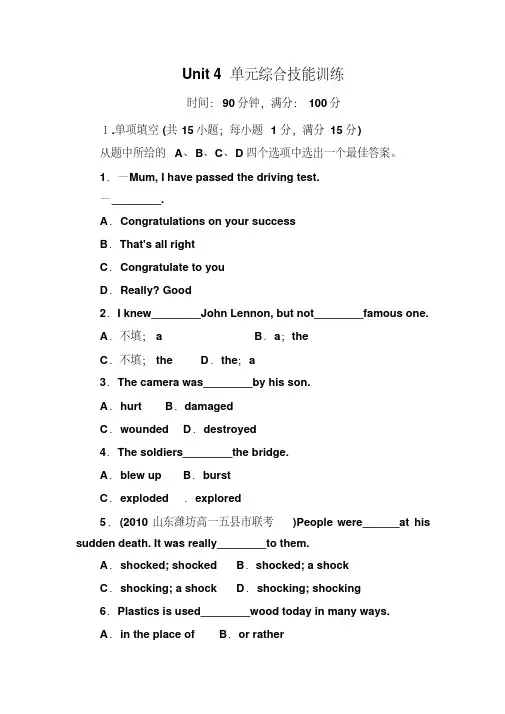
Unit 4 单元综合技能训练时间:90分钟,满分:100分Ⅰ.单项填空(共15小题;每小题1分,满分15分)从题中所给的A、B、C、D四个选项中选出一个最佳答案。
1.—Mum, I have passed the driving test.—________.A.Congratulations on your successB.That's all rightC.Congratulate to youD.Really? Good2.I knew________John Lennon, but not________famous one.A.不填;a B.a;theC.不填;the D.the;a3.The camera was________by his son.A.hurt B.damagedC.wounded D.destroyed4.The soldiers________the bridge.A.blew up B.burstC.exploded .explored5.(2010·山东潍坊高一五县市联考)People were______at his sudden death. It was really________to them.A.shocked; shocked B.shocked; a shockC.shocking; a shock D.shocking; shocking6.Plastics is used________wood today in many ways.A.in the place of B.or ratherC.instead of D.other than7.When he reached the top of the mountain,his heart______very fast.A.struck B.beatC.hit D.jumped8.Let's go to________cinema—that'll take your mind off the problem for________while.A.the; the B.the; aC.a; the D.a ; a9.In China, the number of cities is increasing________development is recognized across the world.A.where B.whichC.whose D.that10.I've had no time to________this meeting, so I'll have to play it by ear.A.prepare B.prepare forC.get it ready D.be ready11.Don't interrupt me. I'm,________,working on a new dress design which, I'm sure, will be popular among ladies.A.right now B.right awayC.right off D.at once12.—Did you remember the days________we w orked on the farm?—Certainly. Especially the hard times________we spent together.A.which;when B.when;whichC.when;when D.which;which13.What difficulty can you imagine________had to get the titleof Miss Chinese International 2007?A.she has B.has sheC.having D.her having14.The hero's story________differently in the newspapers.A.was reported B.was reportingC.reports D.reported15.The shop manager always says to his assistants, “We can never be________polite to our customers.”A.so B.tooC.that D.moreⅡ.完形填空(共20小题;每小题1分,满分20分)阅读下面短文,理解大意,从题中所给的A、B、C、D四个选项中选出一个最佳答案。
第一部分必修1Unit 4Ⅰ.完形填空(2015北京)A Welcome GiftDario and his mother loved their new apartment.The living room was large enough for their piano.That night, the two of them __1__ side by side at the piano.They played jazz music to celebrate their new home.The loud __2__ filled the room and made them feel very happy.The next morning, __3__,their happiness disappeared.Someone had left a __4__ under their door during the night.One of their neighbors had written to complain (抱怨) about the sound of the piano.Dario's mother asked the building superintendent (管理员) if he knew anything about it.But he said that they were all __5__ people and he couldn't imagine any of them had done ter that morning, Dario suggested that they write a letter to their __6__and apologize for their playing.“Maybe we could go and __7__ everyone in person,” his mother said.“What if we invited them to come here for a __8__ instead?” Dario asked.They both loved the __9__.Over the next few days, they sent out invitations and prepared desserts __10__ their guests.They decorated the apartment with streamers (彩带) and party lights.Finally, the day of the party __11__.Some guests brought presents.Others brought flowers.Some even brought desserts to __12__.One woman, Mrs.Gilbert, __13__ Dario's mother with a book of piano music by Chopin.“I heard you playing the other night,” she said.“The sounds woke me out of bed.I __14__ that you might play like this every night.So I wrote a short note.I hope you don't think I disliked the playing.”Dario's mother smiled at Mrs.Gilbert.“I think maybe we __15__ you an apology,”she said.“I didn't __16__ how late it was when we were playing.Maybe we should play some quieter music at night.”“You play, you play!” Mrs.Gilbert said.“I like what you play! Just not so loud at night.” She pointed to the book she had given them.“These songs are not such __17__ music.”“These songs are beautiful music,” Dario's mother said.“We will be __18__ to play them in the evening.”“And we won't play so loud or late!” Dario said.He was already looking forward to __19__ the new music.More than that, however, he was happy to see the big smile on his mother's face.It gave him a feeling of __20__ and made him feel that they were home at last.()1.A.sat B.stoodC.lay D.walked()2.A.voice B.ring C.music D.cry()3.A.therefore B.however C.otherwise D.instead ()4.A.note B.poster C.bill D.report ()5.A.proud B.rich C.lucky D.nice()6.A.neighbors B.friends C.relatives D.audiences ()7.A.blame B.instruct C.question D.visit ()8.A.party B.concert C.show D.play ()9.A.experience B.idea C.performance D.action ()10.A.to B.with C.for D.from ()11.A.continued B.arrived C.passed D.finished ()12.A.order B.sell C.share D.advertise ()13.A.treated B.presented C.helped D.served ()14.A.promised B.admitted C.agreed D.worried ()15.A.give B.send C.offer D.owe()16.A.realize B.remember C.understand D.accept ()17.A.sweet B.strange C.funny D.loud ()18.A.brave B.sorry C.happy D.afraid()19.A.changing B.practicingC.recording D.writing()20.A.equality B.freedomC.warmth D.sympathy【主旨大意】搬进新居的母子俩深夜弹奏钢琴以示庆祝,不料引起邻居的不满。
必修一unit4 Earthquakes词汇学习与应用分层作业(30分钟,共30分)一、基础过关:语境填词(共10小题,每小题1分,满分10分)1. At the sound of the sad news, the little girl b into tears.2. Her left leg was i in the accident. She couldn’t move at all.3. The people trapped by the fire in this building must be r as soon as possible.4. As far as I know, many treasures were b in this tomb a long time ago.5. The news that her husband died in a flood (使震惊)her.6. All the masses should be (组织)to fight against all kinds of pollution.7. This food is (发臭的). You can’t eat it at all.8. He was (恐惧) at the thought of his huge debts.9.Facial ______________(表情)carry meaning that is determined by situations and relationships.10.Then he heard "Help! I__________!(困住)" coming from the second-floor balcony(阳台).二、能力提升:短语活用(共6小题,每小题2分,满分12分)1.My mother __________________ all that I have done and she rewarded me with a trip to Beijing.2.The strong earthquake left the city ____________ merely in several seconds.3.It took me too long ________________ how they had solved the difficult problem.4.It is wrong __________________ everything.5.I realized ______________ that working at the restaurant was not going to be a picnic(轻松的工作).6.As soon as you hear it, you know the meeting is ______________.三、拓展应用:翻译句子(共2小题,每小题4分,满分8分)1.一直往前走,你会在路的尽头找到这家医院。
Unit 4 单元综合检测(人教版必修1)第一部分听力(共两节,满分30分)第一节(共5小题;每小题1、5分,满分7、5分)听下面5段对话.每段对话后有一个小题,从题中所给的A、B、C三个选项中选出最佳选项,并标在试卷的相应位置。
听完每段对话后,你都有10秒钟的时间来回答有关小题和阅读下一小题。
每段对话仅读一遍。
1。
What was the woman?A.A cook、 B。
A manager、C。
A waitress、2.How will the woman get there?A。
By taxi、 B。
By bus、 C.On foot、3。
Where is the man’s ID card?A。
In the drawer、B.On the desk、C。
In the bag、4。
Why is the woman going to the school?A.To pick up her son、B。
To visit her son’s teacher、C。
To ask her son what he does every day、5.What’s th e probable relationship between the two speakers?A。
Doctor and patient、B。
Teacher and student、C。
Father and daughter、第二节(共15小题;每小题1、5分,满分22、5分)听下面5段对话或独白。
每段对话或独白后有几个小题,从题中所给的A、B、C三个选项中选出最佳选项,并标在试卷的相应位置。
听每段对话或独白前,你将有时间阅读各个小题,每小题5秒钟;听完后,各小题将给出5秒钟的作答时间。
每段对话或独白读两遍。
听第6段材料,回答第6至7题。
6.What does the woman think of Bob?A。
He likes playing、B.He likes chatting、C.He is hard working、7.What will the speakers do?A。
第四单元测评(时间:120分钟满分:150分)第Ⅰ卷第一部分听力(共两节,满分30分)第一节(共5小题;每小题1.5分,满分7.5分)听下面5段对话。
每段对话后有一个小题,从题中所给的A、B、C三个选项中选出最佳选项。
听完每段对话后,你都有10秒钟的时间来回答有关小题和阅读下一小题。
每段对话仅读一遍。
1.Where does the conversation most probably take place?A.In a park.B.In a zoo.C.In a pet store.答案:C2.What does the woman mean?A.Things here are very cheap.B.Things here are not cheap.C.She doesn’t know whether things here are cheap or not.答案:B3.Where are the two speakers going to plant the tree?A.By the front door.B.At the back of the garage.C.At the end of the garden.答案:C4.Where does the conversation take place?A.In a shop.B.In a hotel.C.In a restaurant.答案:C5.What do we learn from the conversation?A.The man went to New Zealand during Christmas.B.The man stayed at home during the holiday.C.The man’s parents live in New Zealand.答案:A第二节(共15小题;每小题1.5分,满分22.5分)听下面5段对话或独白。
Unit 4验收检测(时间:120分钟满分:150分)第一部分听力(共两节,满分30分)第一节(共5小题;每小题1.5分,满分7.5分)听下面5段对话。
每段对话后有一个小题,从题中所给的A、B、C三个选项中选出最佳选项,并标在试卷的相应位置。
听完每段对话后,你都有10秒钟的时间来回答有关小题和阅读下一小题。
每段对话仅读一遍。
1.Why is the man's friend's English hard to understand?A.She doesn't receive much education.B.She comes from India.C.She hasn't learned English long enough.2.How are the computers?A.They aren't working.B.Somebody has taken them away.C.They are working right now.3.Why can't the man follow the lady?A.Because the lady is running fast.B.Because the man isn't strong enough to catch up with her.C.Because the lady is speaking fast.4.What are the two speakers talking about?A.The differences between British English and American English.B.The differences between American and British spelling.C.The differences between American and British pronunciation.5.How is the man getting on with his English?A.He finds some difficulties in learning English.B.He has made much progress thanks to a British teacher.C.He is getting along quite well with his English.第二节(共15小题;每小题1.5分,满分22.5分)听下面5段对话或独白。
每段对话或独白后有几个小题,从题中所给的A、B、C 三个选项中选出最佳选项。
并标在试卷的相应位置。
听每段对话或独白前,你将有时间阅读各个小题,每小题5秒钟;听完后,各小题将给出5秒钟的作答时间。
每段对话或独白读两遍。
听第6段材料,回答第6至7题。
6.What's the man's problem?A.He works hard at English, yet makes little progress.B.He hasn't got enough time to learn English.C.He has no interest in English.7.What does the woman suggest doing?A.Practising the dialogues together.B.Doing more listening practice.C.Reading more outside of class.听第7段材料,回答第8至10题。
8.Why does the woman come to see the man?A.To learn English from him.B.To join a club.C.To ask for advice.9.What does the man think of the woman's English?A.It is improving.B.It is just so-so.C.It is good enough.10.What does the man suggest the woman do?A.Spend more time learning English.B.Try to be close to Americans.C.Ask some people for help.听第8段材料,回答第11至13题。
11.What does the man want to learn?A.Computer.B.Driving.C.English.12.How long does the course last?A.20 days.B.37 days.C.45 days.13.When will the final exams be held?A.From August 16 to 18.B.From September 16 to 18.C.From July 15 to August 20.听第9段材料,回答第14至16题。
14.What is the woman's problem?A.She has forgotten to bring her pictures.B.She has no idea what she should write.C.She has missed visiting some places.15.What does the man suggest the woman do?A.Take a voyage.B.Fetch her pictures.C.Write about her trip.16.Why does the man has to leave?A.To pack his bags for his trip.B.To write his composition.C.To calm himself down.听第10段材料,回答第17至20题。
17.When does the woman start school?A.At seven.B.At sixteen.C.At five.18.What happens to the people when they are sixteen?A.They finish high school.B.They leave college.C.They go to primary school.19.What's the difference between America and Britain in schooling system? A.The age when people start school.B.The age when people finish high school.C.The examinations.20.Which country has more exams?A.America.B.Britain.C.Both America and Britain.听力材料Text 1W:I find your friend's English hard to understand.M:Of course. She comes from India and speaks quite differently from British people.Text 2W:Our computers are down.M:I'm afraid I'm not following you. What does that mean?W:That means they're not working.Text 3W:Can you catch the lady's meaning?M:No, I can't. She is speaking so fast that I can't follow her.Text 4M:Are there any differences between British English and American English?W:Certainly. For example, the British say “I have to go back now”,while Americans say “I've got to go back now”.M:Are there any differences in spelling?W:Yeah. For example, “color” is often spelt colour in British English.Text 5W:Hi, Lin Feng. Long time no see. How are you getting along with your English recently?M:Hi, Linda. I've been learning English with an American teacher's help. He told me to listen to the VOA every day, and I've made great progress.W:Congratulations.Text 6M:I give up! I simply can't learn English. I try and try but don't make any progress.W:I know it's hard, but maybe it'll help if we spend more time practising together.M:That's a good idea. But what kind of practice can we try?W:Well, why don't we practise these dialogues together?M:That's a good idea. It might improve our spoken English.W:Sure.Text 7W:Excuse me, Mr. Benson. Can I talk to you for a minute?M:Sure, Mary. What can I help you with?W:I'm really having problems in English. I do all my work and come to class, but I'm not making much progress. What do you think I ought to do?M:Maybe it's a little hard for you to learn English, but you are improving. Do you spend much time with Americans?W:No, not really.M:Why don't you try and make an effort? Maybe you could join a club at school. Another thing I'd suggest is not waiting for Americans to invite you somewhere. There's nothing wrong with calling up someone you've met and asking them to go somewhere.W:Those are good ideas. Thank you very much.Text 8M:Excuse me, Miss. I'd like to get some information about the summer course at the English Training Center.W:Sure. What can I tell you?M:Can you tell me the starting and finishing times of the course, please?W:Yes. The course begins on July 15 and runs until August 20.M:Right, and what courses can we study?W:Well, you have a variety of courses. You have listening and speaking courses, reading and writing. There are also classes in audio-visual training and chances to use the language laboratory as well.M:Right. Do you have a timetable?W:I'm sorry. My workmate isn't here at the moment, so I can't get a timetable for you yet.M:That's OK. And when will the final exams be held?W:At the end of the term. They begin on August 16 and run until August 18.Text 9M:You don't look too happy. What seems to be the problem?W:I've got to write a long composition for my English class, and I just can't come up with any ideas, and it is due tomorrow.M:That shouldn't be too difficult. Remember those pictures you were showing me last week? The ones from your voyage last year.W:Sure, I've got them here somewhere.M:Why don't you write about your impressions of the pyramids in Egypt and the camel ride you took?W:That sounds like a good idea. I can also talk about our visit to the North Africa, the Holy Land, and all of the historical places we visited.M:Well, now that you're feeling better, I think I'll be on my way. I've got to finish my composition too.W:Thanks for your help. I'm much more relaxed now and once I get organized, it won't be so difficult.Text 10W:Well, I suppose the schooling system in America and England is not quite the same way I would imagine. For example, John, what age do you start school?M:In America, most people start school at age five. They go to kindergarten. It's a voluntary thing.W:At five, yes.M:I actually went to a state primary school and I started just after my fifth birthday, um... you know most people start at five and then they can leave when they're sixteen. I actually stayed on until I was eighteen.W:So, basically it's more or less the same starting age. But, er... when do you finish in the States?M:Well, we finish, er... you can go to school, most people finish high school. But you can actually leave school legally at the end of the tenth grade which is about sixteen... when you're sixteen.W:So, more or less actually the same thing. And, er... as far as examinations are concerned, I mean, is it, um... I think it's very different, isn't it?M:Well, exams are not quite the same. We don't have as many exams in America as they do in Britain.答案:1-5BACAC6-10AACAB11-15CBABC16-20BCACB第二部分阅读理解(共两节,满分40分)第一节(共15小题;每小题2分,满分30分)阅读下列短文,从每题所给的四个选项(A、B、C和D)中,选出最佳选项。